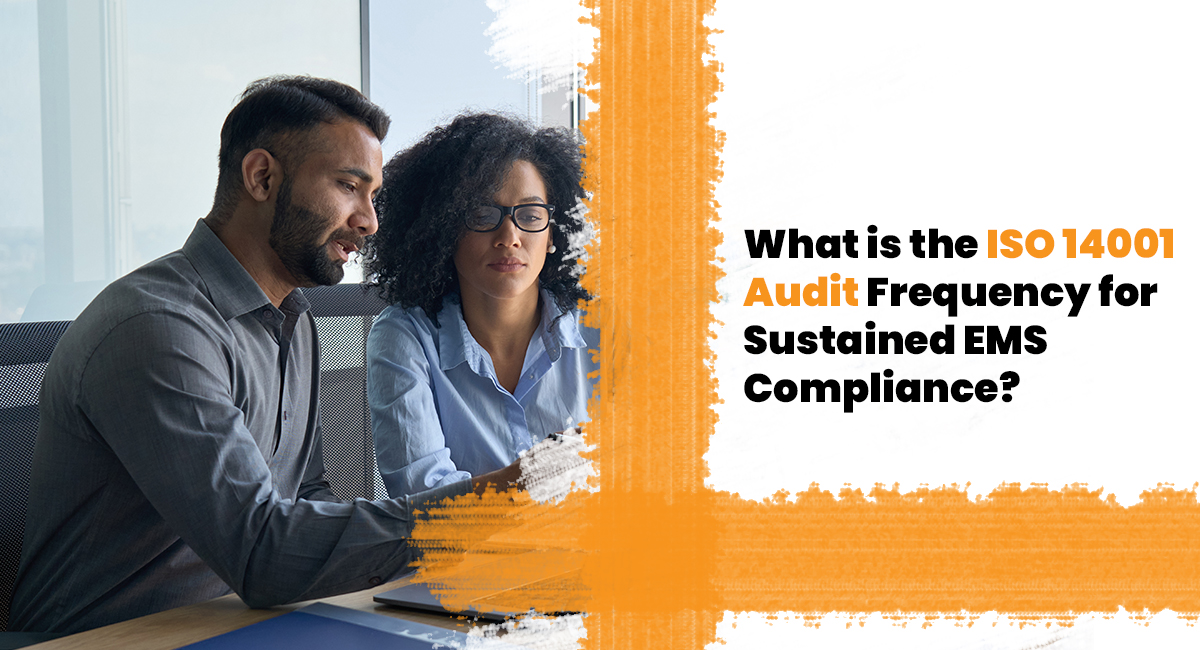QIC Global and Bluewolf operate as a single entity.
QIC Global and Bluewolf operate as a single entity.

ISO (International Organization for Standardization) certifications are a testament to companies demonstrating their commitments to quality, excellence, and adherence to internationally known standards such as ISO 14001. Obtaining an ISO 14001 certification shows that your business cares for the planet and takes serious measures to reduce your carbon footprint. However, to maintain the relevance and validity of the ISO 14001 certification, regular audits are a must. The ISO 14001 audit frequency is a crucial aspect of the compliance strategy of an organization.
Let’s learn more about the frequency of the ISO 14001 standard audit in the following blog post.
What is the ISO 14001 standard?
ISO 14001 is an internationally known standard for EMS (Environmental Management Process).
Implementing the ISO 14001 standard in your business process provides you with a framework to design and implement EMS and improve your brand’s environmental performance continually.
Having ISO 14001 in place can help your organization to improve its environmental performance through the reduction of waste and responsible and more efficient use of resources, which, on the other hand, can benefit you with a competitive advantage and increase stakeholders’ trust.
Almost any organization, regardless of location, sector, or size, can benefit from getting ISO 14001 certified.
What is the frequency of the ISO 14001 standard audit process?
The ISO 14001 certification process requires organizations to complete a two-part audit process successfully to implement the ISO 14001 standard within the process.
However, it isn’t the end!
After completing the initial certification audit, businesses must also complete yearly surveillance audits along with a recertification audit every three years to maintain the ISO 14001 certification.
They are as follows:
1.ISO 14001 Audits for the Initial Certification
An organization undergoes this ISO 14001 audit process when it seeks the ISO 14001 certification for the first time.
This audit process includes a comprehensive evaluation process assessing whether the business’s management system meets the ISO 14001 requirements or not.
Upon successful completion, the organization receives its initial certification.
2.ISO 14001 Audits for Initial Surveillance
Following the initial ISO 14001 certification audit process, the organization enters the surveillance audit cycle.
These audits are periodic and conducted at defined intervals (normally annually) to ensure that the organization’s EMS is effective and continuing compliance.
Alongside that, the surveillance audits also verify that the organizational procedures are aligned with the ISO 14001 standard consistently.
3.ISO 14001 Audits for Annual Surveillance
The annual surveillance audits are the cornerstone of maintaining the ISO 14001 certification.
Accredited certification bodies conduct these annual surveillance audits to evaluate the ongoing compliance of the organization.
These audits also serve as a snapshot assessment of the business’s EMS, showing whether it continues to meet the ISO 14001 requirements.
The frequency of these audits offers a structured approach to ensure compliance allowing brands to identify and address any areas for further improvement in a timely manner.
4.Special ISO 14001 Audits in Response to Significant Changes
Besides the annual surveillance audits, organizations may also undergo special audits in response to significant changes (if any) within the business process.
These changes can be anything, including the following:
• Mergers
• Significant alterations to systems or procedures
• Expansions
• Acquisitions
Conducting these special ISO 14001 audits helps organizations to ensure that their EMS remains aligned with the ISO 14001 standard and effective even when facing substantial organizational changes.
5.ISO 14001 Audits for Recertification
Like other ISO certifications, the ISO 14001 certification also comes with a defined validity period, usually for three years.
To renew the ISO 14001 certification after this period, organizations undergo a re-certification ISO 14001 audit process.
This audit process is similar to the initial ISO certification audit process in terms of scope and rigor to evaluate whether the EMS is complying with the ISO 14001 requirements or not.
The ISO 14001 re-certification audit acts as a comprehensive assessment to confirm the organizations’ commitment to maintain compliance over an extended period.
Successful completion of this audit results in the renewal of the ISO 14001 certification.
6.ISO 14001 Audits for Continual Improvement
Even though they are not formally ISO 14001 audits, the ISO 14001 continual improvement audits should be conducted internally within the organization.
These audits are necessary for the ISO 14001 certification process, emphasizing the principles of continual improvement inherent in the ISO 14001 standard.
The ISO 14001 continual improvement audits help companies identify opportunities to enhance their EMS and ensure that it remains dynamic and adaptable to transforming business needs and environments.
How to find the right third-party ISO 14001 audit specialists for your organization?
Considering the following can help you find the right one:
• Expertise and reputation
• Knowledge of the ISO 14001 standard
• Understanding of the ISO 14001 requirements
• Client testimonials and portfolios on ISO 14001
• Estimated budget and timeline for the ISO 14001 certification process
Take away
Obtaining an ISO 14001 certification is indeed an important and responsible task. However, the responsibilities don’t end just there after getting your company ISO 14001 certified. Maintaining your ISO 14001 certification needs a structured approach to audits. We hope this blog post helps you understand the ISO 14001 audit frequency and when you should conduct them.